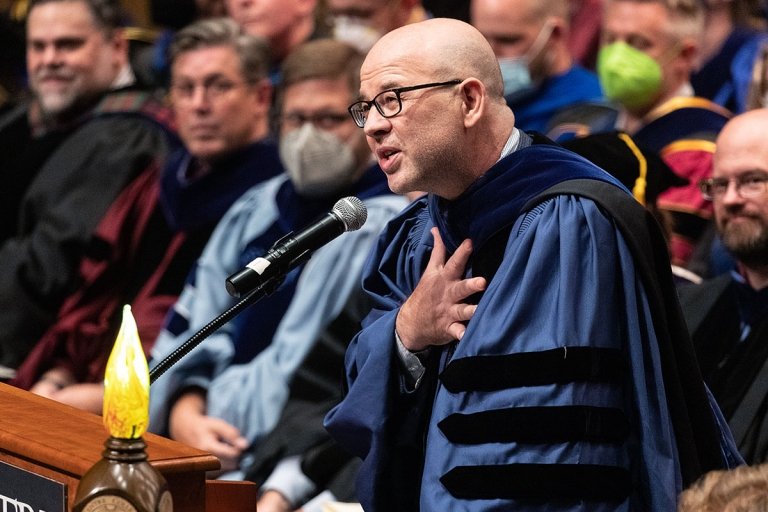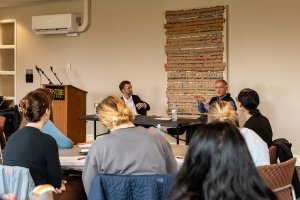Opening Convocation Address: “Something to Add to Your List”
With ceremony, solemnity and pageantry, Centre College’s Opening Convocation heralded the official start of the academic year on Sunday, Aug. 28. NEH Professor of Music Nathan Link provided the address.

To the members of the Board of Trustees, the president’s office, the dean and the academic affairs office, the faculty, students, and especially the incoming class of 2026: Welcome to the beginning of Centre’s 2022–23 academic year. It’s an exciting moment, to be sure; I know that it can also feel like an intimidating one. And I know that with increasing frequency, urgency, and volume, you’ve all been getting advice on how to succeed in college—probably so much that you’re getting pretty sick of it at this point. But I’m asking you to tune in one last time, because I have a few thoughts on the topic as well. Hence the title of this talk: “Add this to your list.”
On a personal level, there’s the anticipation of an academic and social life you’ve never experienced before, and you’ve probably stopped to wonder more than once, “can I do it?” “do I have what it takes?” “will I succeed or will I fail?” or some related question. I’ll go ahead and give you the answer (no suspense): you can do it, and you will do it, and do you have what it takes. You’re here because our excellent admissions team knows that you have what it takes. But to examine the question in a little more depth: throughout this talk, I’d like to spend some time considering these terms we throw around so loosely—failure, success, winning, losing,—what are these things? How do we recognize them? It might be worth re-examining some of these conceptions as we embark upon this journey.
The Man Who Lost His Horse
Let’s start with a paraphrase of a story from a Chinese text from the second century BCE, which has been retold with various alterations over the years. There was a man who lived in the borderlands, and one day, his only horse ran away. His neighbors felt pity for him. “Such terrible news,” they said. “You must be so upset!” “We shall see,” said the man. A few days later, his horse came back, bringing with it a second horse! Now the man had two beautiful, strong horses. His neighbors congratulated him: “Two horses—how incredibly fortunate you are!” The man replied, “We shall see.” His son, an avid rider, took to riding the second horse, but this new horse turned out to be wild and unpredictable. One day, it threw the son off as he was riding, and the son broke his leg badly, temporarily becoming unable to walk. “Oh dear,” said the man’s neighbors. “What a terrible turn of events. You are so unlucky!” “We shall see,” said the old man. Some time later, the army arrived to conscript the son to fight in a deadly war at the borderlands. But because of his leg injury, the son was not taken to the war and remained safely at home. “What luck!” said the neighbors. “We shall see,” said the man.
The apparent sentiment here is not an entirely unfamiliar one—we are told that “every cloud has a silver lining,” “every rose has its thorn,” and so on. But it asks us, I think, to consider more deeply our notions of “good thing” and “bad things,” of “success and failure.” You’ve surely been given ample advice along the lines of “here’s what you’re gonna need to do to ‘succeed’ in college.” But what is a success and what is its opposite, failure, and can we be confident in our initial assessment of which is which? Imagine your first class at Centre. Now imagine you learn that a friend gets an A in that class. They’ve found success, right? You of course congratulate your friend. Now imagine that you do not get an A. Does this mean you were less successful than your friend? What if you were so deeply fascinated with one certain aspect of the class that you were driven to investigate this aspect thoroughly and deeply, not leaving you time to master every aspect of the course, but instead leading you in the direction of finding your passion, your calling, your life’s work?
One way to think of the college experience is to think of the different ways in which your identity will manifest itself now that you’ve begun college, the different “teams,” if you will, of which you are part. One of those we might term “Team Centre”—the college community itself. The second, “Team Home”—the loved ones who have been, and remain behind you, supportive of you, and on your side through this whole endeavor. And finally, what at first might seem a bit of an oxymoron: “Team You”—constituted of your own commitment, engagement, investment, and contributions to this journey.
Let’s start with Team Home.
I’ll speak here as the parent of college students, including a junior, studying close to home, and another who I just dropped off far away a week ago. And I’m speaking on behalf of those of us with loved ones starting—or continuing—college. We, collectively, as parents, family, friends, teachers, mentors, coaches—all of those people who have been with you on your journey to this point—we love you. To say that we’re proud of you is an almost unforgivable understatement. And although we do our best not to show it, our hearts are a little bit broken, and we miss you already. We think about you constantly. Actually, we’re just plain pathetic. Here’s how pathetic we are: we have your course schedule on our Google calendars—even the building and room, and we check it hourly to see what class you’re in. If you share location on your phone, we’re checking Google maps during the day to see what class building you’re in, just to give ourselves an excuse to think of you and say, “there they are, there’s our person!” We know the exact number of days until the next time we see you, fall break or Thanksgiving or whatever the case may be, and we’ve already made embarrassingly specific plans about how we’re going to welcome you back the first time you come home.
Yes, we’re pathetic, and very sincerely—if there’s anything we can do to help, ask us, it will be a gift to us, and we might even be able to be in some way useful. And if there isn’t anything we can actually do? Maybe you could throw us a bone to let us know we still matter. I don’t know, tell us you want a box of those cookies you always liked, but which you can’t get at your new college home. (Even if you actually can get them very easily.) This might sound more like you’re taking care of “Team Home” than “Team Home” is taking care of you, and there’s probably some truth to this. But it’s not really either/or; it’s not always apparent on the surface who’s the giver and receiver of a gift. I think it’s both/and, and we’ll return to this concept presently.
In any case, we might not be with you physically, but our hearts certainly are, and they always will be, every step of the way. And we’ll always be just a phone call or Facetime or text message away.
Team Centre
We often hear some variant of “You have to look out for number one,” or “At the end of the day, you gotta to put your needs first,” or some such thing. This is not wrong! You must take care of yourself—your physical and mental health, your emotional wants and needs, and so on, and what’s more, you’re the person best positioned to know how to do it. But I think the framing here—you have to put your needs first sets up an assumption that the your needs necessarily at odds with the those of your fellow humans—and that you need to be sure to prioritize the former over the latter. Maybe it’s not so straightforward. Let’s take the example of sleep. No serious person that I know of has suggested that getting adequate high-quality sleep is anything but central to your well-being. And that early-morning class across campus at the art barn sure does cut into your sleep. Now I know many of you bit the financial bullet, paid the surcharge, and brought your private helicopters to campus. And you do a little mental calculation, and realize that you could save yourself as many as ten minutes—and that means ten whole extra minutes of glorious sleep—by flying your helicopter to class instead of walking. Gotta look out for number one! But that helicopter trip—the air and noise pollution, the waking up of those fortunate enough to not to have an 8am class that day, basically doing your part to build a grumpier and more resentful Centre. Not to mention carbon emissions. Are you going to be able thrive in such an environment? Or is it perhaps the case that by looking out for Team Centre, getting your extra sleep by going to bed earlier the night before and then walking to class, you really are taking care of yourself—you need a healthy community and healthy planet just as much as everyone else.
Or imagine you’re the top student in a difficult class. You’re invited to a study session for the midterm exam. You were planning on playing some video games that night. Not that there’s anything wrong with video games—I find them a great way to relax, and relaxation is important! But this is a big exam, a make-or-break moment for some in the class. You don’t need it for you—for number one—but your classmates—your Team Centre—sure could use your help. So yes, you’ll be helping Team Centre, but consider the possibility that you’ll also be helping yourself. The classmates at that study session for whom your insights finally enable the proverbial lightbulb to click? What if they go on to succeed in a way that benefits humanity—the chemistry student who becomes a pharmaceutical scientist and whose approach is instrumental in the development of a new medicine—one that you or a loved one might one day need? Or the psychology who develops a novel approach to counseling that leads to the improved wellbeing of humanity, again, very possibly including you or your loved ones? Or the music student who becomes a songwriter whose compositions help make the world a more beautiful place? It’s not either/or, it’s both/and: when you help your community—in this case Team Centre—you’re probably not doing so at any cost to Team You; indeed, you’ll probably find in more cases than not that helping your team helps yourself.
Team You
Some of the advice you’ve received has probably been particularly intimidating, as if the prospect of an entirely new lifestyle surrounded by new and unfamiliar people and centered upon studying complex topics at an academically rigorous college wasn’t intimidating enough. You might have heard something like this: “Treat your education as if the world depends on it. Because it does.” This certainly isn’t the sense I had entering college, when the Zeitgeist among college students seemed much more carefree, but it seems to be a prevalent line of thought now, and with good reason: the world is in real trouble, and the actions of your generation are crucial to the very survival not only of the species but of the planet. This advice might feel burdensome—you didn’t ask for this weight, this responsibility, to be placed on your shoulders. But in the words of Gandalf the Grey, nor do any “who live to see such times. But that is not for them to decide. All we have to decide is what to do with the time that is given us.”
Or how about this, on a more personal level: “You’re in college not just to prepare yourself to make a living, but to prepare yourself to make your life.” What weighty words! And again, they ring true: your college experience will play a tremendous role in shaping the life that you’ll lead going forward.
How then not to be overwhelmed by the seeming enormity of what lies ahead? A crucial aspect is reaching out, in whatever way works best for your unique situation: to the support staff, to your professors, to your classmates. This will mean forging relationships, which can come in many different forms, and you might not know what form it will take just yet. Maybe you’ll make a lot of friends with other students. Maybe you’ll forge a valuable mentor/protégé relationship with a professor, advisor, or voice instructor. Maybe you’ll find a counselor whose insights change your life. Whoever it is, be as honest as you can, be open about what you consider to be your successes and failures. And remember, it’s almost impossible, in the moment, to definitively distinguish the good from the bad, the successes from failures, the rose from the thorn. (You got an A in a difficult class? What a success! You found the class, which was in your intended major, entirely uninspiring? Catastrophe! You then switched majors to a more engaging topic? What a blessing! Your favorite professor in that new major retired? Devastating!) And on and on and on, like the man who lost his horse.
Please remember: when it comes to “Team You,” as intimidating as this new college environment might sometimes be, you’re not alone. We—the staff who provide support services, the faculty, those in administration who keep the ship running—have in a very real sense dedicated our lives to helping you, and we stand ready and eager to do so.
So you’ve made it through what has to be your last session of hearing advice about starting college, before you actually start college. This evening we’ve already considered the words of an ancient Chinese text and a wizard from a twentieth-century fantasy novel, and now we turn to another brave philosophical mind: Dora the Explorer: Come on let’s get to it, I know that we can do it! I hope that you get off to a great start, and that you don’t lose your proverbial horse, at least not on the first day, but you might! And if you do, well…we shall see.



